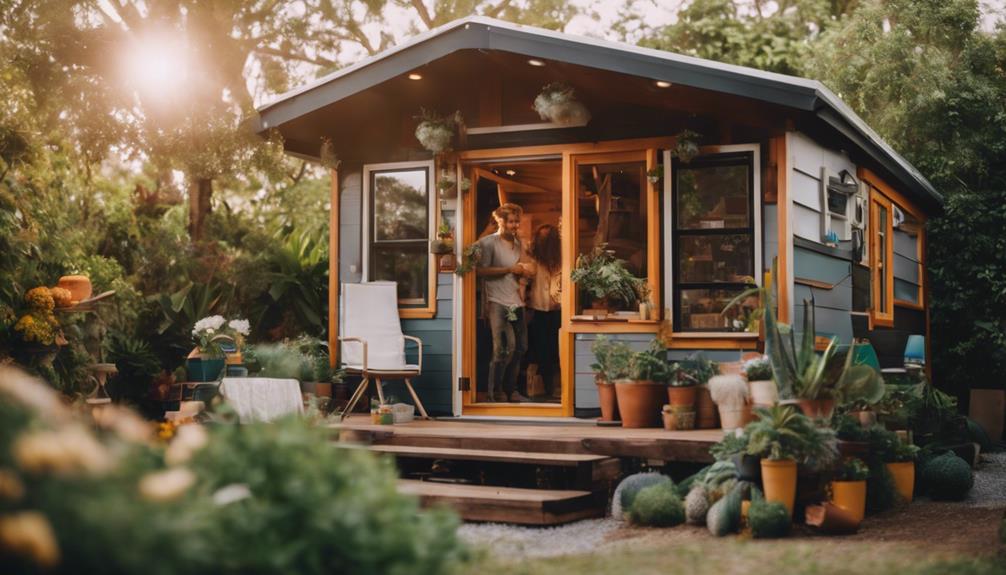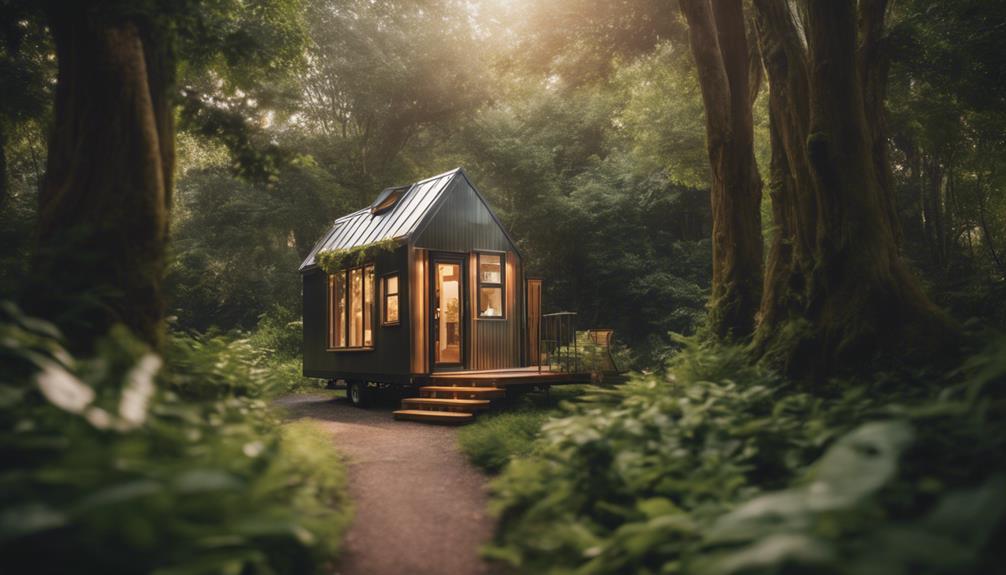In 2019, Colton Paulhus launched a tiny home empire from a viral Facebook post, sparking immense interest in affordable housing. His company specializes in tiny homes and ADUs, skillfully maneuvering favorable regulations in California. With sales skyrocketing from $16.7 million to $49 million in just two years, they embraced a franchise model for expansion. The focus on sustainability and innovative designs has attracted eco-conscious consumers while building strong community ties. As the tiny home movement grows, those curious about the journey from a single post to widespread success might just find more insights waiting ahead.
Key Elements

In the Tiny Home Empire, several key elements shape the business landscape.
The company overview highlights its rapid growth and market positioning.
The business overview outlines the unique opportunities within the tiny home and ADU sectors.
Additionally, critical information for franchisees emphasizes the importance of understanding regulations and market dynamics before entering this promising field.
Company Overview
Anchored Tiny Homes, founded by Colton Paulhus in response to a burgeoning demand for affordable housing solutions, specializes in tiny homes and ADUs, leveraging favorable regulations to tap into a rapidly growing market.
The company initially gained traction through a Facebook ad in 2019, garnering 300 inquiries in just three days. Recognizing the larger market potential for ADUs, Anchored pivoted its focus in 2020.
The company emphasizes collaboration with local municipalities to navigate varying regulations, ensuring compliance and facilitating franchise opportunities.
With a commitment to sustainability and minimalist living, Anchored Tiny Homes aims to provide innovative housing solutions that meet the needs of diverse communities, ultimately reshaping the landscape of affordable housing.
Business Overview
The business model of Anchored Tiny Homes focuses on delivering innovative housing solutions through tiny homes and ADUs, addressing the growing demand for affordable and sustainable living options.
By identifying the significant market potential for ADUs, the company pivoted its strategy in response to favorable California regulations, enhancing its competitive edge.
Anchored Tiny Homes has successfully established a franchise system, allowing for rapid expansion while maintaining consistent quality.
With impressive sales growth from $16.7 million to $49 million within two years, the company demonstrates strong market viability.
Their emphasis on sales skills and brand commitment guarantees franchisees are equipped to thrive.
Information for Franchisees
Potential franchisees should thoroughly understand the essential elements that influence their success in the tiny home and ADU market.
First, they must grasp local regulations, as these vary greatly across municipalities and can affect the legality of tiny homes and ADUs. It's important to consult legal experts to navigate this complex landscape.
Additionally, franchisees should recognize the growing demand for ADUs, especially in states like California and Florida, where laws are more favorable.
Sales skills and a strong commitment to the brand are critical for franchisees, as demonstrated by Anchored Tiny Homes' rapid growth.
Company Overview

Anchored Tiny Homes emerged after a viral Facebook ad showcased the growing demand for tiny living spaces.
With a focus on sustainable living and innovative design, the company quickly gained traction, thanks in part to its founders' construction expertise.
Franchise sales have skyrocketed, reflecting the market's enthusiasm for affordable housing solutions.
Founded After Viral Facebook Ad
After discovering a viral Facebook ad in 2019, Colton Paulhus jumped into the tiny home market, leading to the establishment of Anchored Tiny Homes. Within just three days, the ad generated 300 inquiries, showcasing a strong demand for tiny living solutions.
Recognizing the potential, Colton founded a family business that initially focused on tiny homes but quickly pivoted to accessory dwelling units (ADUs) due to favorable California regulations in 2020. This strategic shift allowed Anchored Tiny Homes to tap into a much larger market.
The company's rapid growth led to franchising opportunities, attracting aspiring entrepreneurs keen to engage in the booming tiny home and ADU sector, further solidifying its presence in the industry.
Sustainable Living Through Innovative Design
Through innovative design, the company champions sustainable living by creating efficient, eco-friendly tiny homes and ADUs that meet modern lifestyle needs.
Anchored Tiny Homes focuses on maximizing space while minimizing environmental impact, utilizing sustainable materials and energy-efficient technologies. Each unit is thoughtfully designed to promote a minimalist lifestyle, encouraging occupants to embrace simplicity.
The company's commitment to sustainability extends beyond construction; it actively engages in community initiatives aimed at promoting green living practices. By prioritizing environmentally responsible design, Anchored Tiny Homes not only addresses the housing crisis but also inspires a shift towards more sustainable living choices.
Their approach reflects a growing trend of integrating eco-consciousness into everyday life, appealing to an audience enthusiastic for innovative solutions.
Founders With Construction Expertise
The founders of Anchored Tiny Homes bring valuable construction expertise to the company, enhancing its ability to create high-quality, innovative living spaces that align with sustainable living principles.
Their strong background in construction allows them to navigate the complexities of building tiny homes and ADUs efficiently.
With a deep understanding of materials, design, and local regulations, they guarantee that each project meets safety standards while maximizing space and functionality.
This expertise not only streamlines the building process but also fosters a commitment to sustainability, enabling the company to deliver eco-friendly homes.
As Anchored Tiny Homes continues to grow, the founders' skills will be pivotal in maintaining quality and innovation in the rapidly evolving tiny home market.
Franchise Sales Growth Statistics
Anchored Tiny Homes has seen remarkable franchise sales growth, skyrocketing from $16.7 million in its first year to $49 million the next. This impressive increase underscores the brand's strong market presence and the rising demand for tiny homes and ADUs.
Since launching its franchise model in 2020, the company has fostered a diverse pool of franchisees, welcoming individuals without prior construction experience. Planned franchise locations in cities like Austin, Jacksonville, and Salt Lake City further highlight the brand's expansion strategy.
Brand Identity

In the world of tiny homes, brand identity plays a vital role in shaping perception and driving engagement.
By focusing on sustainability and community, companies can create a strong connection with their audience, while innovative design approaches further enhance their appeal.
Social media success amplifies these efforts, allowing brands to showcase their values and attract like-minded customers.
Social Media Engagement Success
Building a strong brand identity on social media is essential for engaging potential customers and establishing trust in the tiny home and ADU market.
Anchored Tiny Homes effectively utilizes platforms like Facebook and Instagram to showcase their unique offerings, share customer testimonials, and highlight the benefits of tiny living.
By consistently posting visually appealing content and interacting with followers, the brand fosters a sense of community and encourages customer loyalty.
They also leverage targeted ads to reach specific audiences, driving inquiries and interest.
Engaging storytelling and authentic communication further enhance their brand identity, allowing them to connect emotionally with potential buyers.
This strategy not only builds trust but also positions Anchored Tiny Homes as a leader in the growing tiny home market.
Sustainability and Community Focus
Sustainability and community focus are at the heart of the brand identity for tiny home businesses, promoting eco-friendly living while fostering strong neighborhood connections. These companies endeavor to create homes that minimize environmental impact, encouraging a lifestyle that values resource efficiency. By embracing sustainable practices, tiny home businesses attract like-minded individuals who prioritize reducing their carbon footprint.
Moreover, they cultivate community by designing neighborhoods that emphasize collaboration and support among residents. This focus on connection helps build lasting relationships, enhancing residents' overall quality of life.
As a result, tiny home businesses not only contribute to sustainable living but also create vibrant communities where people share resources, knowledge, and experiences, reinforcing the idea that smaller living spaces can lead to richer lives.
Sustainability-Focused Design Approach
Emphasizing eco-friendly materials and energy-efficient designs, tiny home businesses establish a brand identity that resonates with environmentally conscious consumers.
By prioritizing sustainable practices, these companies not only attract buyers but also create a loyal customer base committed to minimizing their ecological footprint.
Their designs often incorporate renewable resources, efficient insulation, and solar energy solutions, setting them apart in a competitive market.
Additionally, the focus on smaller living spaces encourages minimalism, allowing consumers to align their lifestyles with their values.
This sustainability-focused approach fosters community engagement, as customers feel they're part of a larger movement towards responsible living.
Ultimately, this brand identity not only enhances market appeal but also contributes positively to the environment.
Information for Franchisees

Franchisees in the tiny home market must thoroughly understand local regulations to navigate the complexities of tiny homes and ADUs effectively. Each municipality has its own rules determining the legality and classification of these structures, which can greatly impact business operations.
Franchisees should consult legal experts familiar with local laws to guarantee compliance and avoid potential pitfalls. Knowledge of the differences between tiny homes and ADUs is essential, as these distinctions affect zoning and building codes.
Staying informed about regulatory changes helps franchisees adapt swiftly to any new requirements. By fostering relationships with local authorities, franchisees can gain insights that enhance their business strategies and improve their chances of success in this growing market.
Financial Requirements & Ongoing Fees

When considering a franchise in the tiny home market, prospective owners need to grasp the financial requirements and ongoing fees involved.
They must account for startup capital, initial investments, and ongoing costs like a percentage of sales and marketing contributions.
Understanding these financial elements guarantees franchisees are prepared for the business's economic landscape.
Startup Capital Requirement
Starting a tiny home or ADU franchise requires significant startup capital, including initial franchise fees, construction costs, and ongoing operational expenses. Franchisees need to budget for these expenses to guarantee a smooth launch.
The initial franchise fee may vary, depending on the brand, but it typically includes access to training, support, and marketing resources. Construction costs can be substantial, reflecting local materials and labor rates.
Additionally, ongoing operational expenses like utilities, insurance, and maintenance must be factored into the financial plan. Franchisees should also anticipate costs related to marketing and customer acquisition, as establishing a strong local presence is essential for success in this competitive market.
Understanding these financial requirements helps franchisees prepare for sustainable growth.
Initial Investment Requirement
Investing in a tiny home or ADU franchise involves significant financial commitments, including initial fees, construction costs, and ongoing operational expenses.
Franchisees typically face an initial franchise fee, which grants access to the brand and its support. Construction costs can vary greatly depending on local market conditions, materials, and design choices, often requiring substantial capital upfront.
Beyond initial investments, ongoing operational expenses include property maintenance, utilities, and payroll for employees. Additionally, marketing costs are vital for attracting customers and building brand recognition.
Understanding these financial requirements is essential for potential franchisees to guarantee they can sustain their business and realize profitability in this growing market. Proper financial planning can lead to successful franchise operations in the tiny home industry.
Ongoing Percentage of Sales
Franchisees in the tiny home and ADU market typically pay an ongoing percentage of sales, which contributes to brand support and operational resources. This percentage often ranges from 4% to 8%, depending on the franchise agreement.
These fees are essential for maintaining brand integrity, providing franchisees with access to training, operational tools, and ongoing support. Additionally, the fees help fund product development and enhance marketing efforts.
Franchisees must budget for these ongoing costs, as they can greatly impact profitability. Understanding the implications of these fees helps franchisees make informed financial decisions, ensuring they can sustain their business while benefiting from the established brand.
Ultimately, these contributions foster a collaborative and supportive franchise environment.
Marketing Contribution Percentage
Typically, franchise agreements in the tiny home and ADU market require a marketing contribution percentage, which helps fund national advertising campaigns and brand promotion efforts. This percentage typically ranges from 1% to 5% of gross sales, depending on the franchise's specific terms.
Franchisees must budget for these contributions as part of their ongoing financial commitments. This investment not only supports larger marketing initiatives but also enhances the brand's visibility and reputation, ultimately driving customer interest and sales.
Utility and Maintenance Expenses
Understanding the ongoing utility and maintenance expenses is essential for franchisees in the tiny home and ADU market, as these costs greatly impact overall profitability and operational sustainability.
Franchisees need to budget for utilities such as water, electricity, and gas, which can vary considerably based on location and usage.
Regular maintenance, including repairs and landscaping, also represents a recurring expense that must be accounted for in financial planning.
Additionally, property taxes and insurance add to the financial commitments.
By thoroughly evaluating these costs, franchisees can set realistic pricing strategies and guarantee they maintain a healthy profit margin.
Ultimately, having a clear grasp of these expenses is critical for achieving long-term success in the business.
Financing Options

When considering financing options for tiny homes, buyers have several avenues to explore.
In-house financing can simplify the process, while alternative funding sources offer additional flexibility.
Government-backed loan providers also present viable solutions for those looking to invest in this growing market.
In-House Financing Options Available
Anchored Tiny Homes offers flexible in-house financing options to make purchasing a tiny home or ADU more accessible for potential buyers. By providing tailored financing solutions, the company aims to reduce barriers that often deter customers from entering the tiny home market.
These options include low down payments, competitive interest rates, and extended repayment terms, catering to various financial situations. Potential buyers can easily navigate the financing process with dedicated support from Anchored's knowledgeable team, ensuring they find the plan that best fits their needs.
This commitment to accessible financing reflects the company's mission to promote sustainable living and affordable housing, allowing more individuals to embrace the tiny home lifestyle without overwhelming financial burdens.
Alternative Funding Sources Available
Many potential buyers explore alternative funding sources to finance their tiny home or ADU purchase, seeking options beyond traditional loans.
Crowdfunding platforms allow individuals to raise funds from friends, family, or even strangers who share their vision.
Peer-to-peer lending offers another route, connecting borrowers with investors willing to fund their projects directly.
Some buyers turn to personal savings or retirement accounts, leveraging these assets for their down payment.
Additionally, seller financing can provide an opportunity for buyers to negotiate terms directly with the seller, bypassing financial institutions.
Government-Backed Loan Providers
Government-backed loan providers frequently offer financing options that can make purchasing a tiny home or ADU more accessible for buyers.
These loans typically come with lower interest rates and more favorable terms, which can ease the financial burden on those looking to invest in alternative housing.
Programs like FHA loans may cover tiny homes and ADUs, provided they meet specific requirements. Additionally, some state and local governments offer special financing programs aimed at promoting affordable housing solutions.
Buyers should explore these avenues to find the best fit for their financial situation.
Training & Support Offered

In the Tiny Home Empire, training and support play a crucial role in franchise success.
Franchisees benefit from thorough onboarding workshops that equip them with essential skills, along with ongoing programs to enhance their abilities.
Additionally, sales and marketing assistance guarantees they can effectively promote their businesses in a competitive market.
Comprehensive Onboarding Workshops
Thorough onboarding workshops provide franchisees with essential training and ongoing support, ensuring they understand the intricacies of the tiny home and ADU market.
These workshops cover vital topics, including local regulations, market trends, and operational best practices. Franchisees learn how to navigate the legal landscape and identify opportunities that align with their business goals.
Experienced trainers facilitate sessions that foster engagement, allowing franchisees to ask questions and share insights. Additionally, the workshops emphasize brand values and commitment, preparing franchisees to represent Anchored Tiny Homes effectively.
Continuous Skill Enhancement Programs
Anchored Tiny Homes offers continuous skill enhancement programs that empower franchisees to stay updated on industry trends and refine their operational capabilities.
These programs include workshops, webinars, and hands-on training sessions tailored to the unique challenges of the tiny home and ADU markets. Franchisees gain insights into best practices, regulatory changes, and emerging technologies, ensuring they remain competitive.
Additionally, the company provides access to a network of experienced professionals, fostering collaboration and knowledge sharing. By prioritizing skill enhancement, Anchored Tiny Homes cultivates a community of well-informed franchisees who can navigate the complexities of the industry with confidence.
This commitment to training and support not only enhances individual business success but also strengthens the overall brand reputation in the market.
Sales and Marketing Assistance
Building on the foundation of skill enhancement, the franchise provides robust sales and marketing assistance to help franchisees effectively promote their tiny home and ADU offerings.
Franchisees gain access to extensive training programs that cover essential sales techniques, branding strategies, and digital marketing tactics. This support guarantees they can reach their target audience effectively and convert leads into sales.
Additionally, the franchise offers ongoing marketing materials, including promotional content and social media guidelines, to maintain brand consistency. By leveraging the franchise's established marketing framework, franchisees can focus on growing their businesses while benefiting from proven strategies.
This collaborative approach fosters a strong community, enabling franchisees to share insights and best practices for continued success in the competitive market.
LEGAL AND REGULATORY

Steering through the legal and regulatory landscape is essential for franchisees in the tiny home market.
Each local jurisdiction has its own rules, which can greatly affect the legality of tiny homes and ADUs.
Franchisees must stay informed and seek guidance to guarantee compliance with these varying regulations.
Franchise Legal Compliance Guide
In the Tiny Home Empire, franchisees must prioritize understanding their legal obligations to guarantee compliance with local regulations.
Key sections of the Franchise Legal Compliance Guide outline essential points to review, helping franchisees navigate the complex landscape of tiny home and ADU laws.
Key Sections to Review
Franchisees must thoroughly understand the legal and regulatory landscape governing tiny homes and ADUs to secure compliance and successful business operations. This includes reviewing local zoning laws, building codes, and permit requirements.
They should also familiarize themselves with franchise agreements and any specific regulations impacting their business model.
Consulting legal experts guarantees they navigate complexities effectively and maintain compliance in their operations.
Legal Obligations
Understanding legal obligations is essential for franchisees to guarantee compliance with the varying regulations surrounding tiny homes and ADUs.
They must familiarize themselves with local laws, as municipalities dictate the legality of these structures.
Consulting legal experts helps navigate these complexities, ensuring franchisees adhere to classification differences and operational requirements.
Ultimately, this approach safeguards their investments and promotes business success in this evolving market.
MARKET ANALYSIS

The tiny home market is experiencing a surge in demand, particularly among Millennial and Gen Z buyers who prioritize sustainable living.
These younger generations seek affordable housing solutions that align with their values, driving interest in both tiny homes and ADUs.
As awareness of environmental impact grows, the appeal of minimalist lifestyles continues to strengthen in the housing market.
Growing Demand for Sustainable Housing
The rising popularity of Accessory Dwelling Units (ADUs) reflects a significant shift towards sustainable housing solutions across the nation.
As more homeowners seek affordable and eco-friendly living options, the ADU market shows a promising growth trajectory.
This trend not only addresses housing shortages but also aligns with the growing demand for minimalistic lifestyles.
Increased ADU Popularity Nationwide
Nationwide, demand for Accessory Dwelling Units (ADUs) has surged as homeowners increasingly seek sustainable housing solutions and flexible living arrangements.
This trend reflects a broader shift toward minimalist lifestyles and affordability.
Many homeowners view ADUs as a way to generate rental income or house family members, driving interest in this innovative housing option.
As regulations relax, ADUs continue gaining momentum across the country.
ADU Market Growth Trajectory
Growing interest in sustainable housing solutions has propelled the ADU market into a promising growth trajectory.
As more homeowners seek affordable living options, ADUs provide a practical answer.
Favorable regulations in states like California and Florida further enhance demand.
Additionally, the shift towards multi-generational living and rental opportunities solidifies ADUs' place in the housing market, making them increasingly attractive for investment.
Millennial and Gen Z Buyers
Millennials and Gen Z buyers are reshaping the housing market with their unique preferences for smaller, more affordable living spaces.
Recent surveys show that these generations prioritize sustainability and minimalism, making tiny homes an attractive option.
Understanding their specific housing desires is essential for businesses looking to capitalize on this emerging trend.
Millennial Homebuyer Preferences
A significant shift in homebuyer preferences is evident as Millennials and Gen Z increasingly seek affordable, sustainable housing solutions that fit their lifestyles.
They prioritize energy efficiency, minimalism, and proximity to urban amenities over traditional large homes.
This demographic values flexibility, often favoring tiny homes and ADUs as practical options that align with their environmental consciousness and desire for community-oriented living.
Millennial Housing Preferences Survey
Recent surveys reveal that younger buyers are increasingly drawn to affordable and sustainable housing options, favoring tiny homes and ADUs for their flexibility and minimalistic appeal.
This demographic prioritizes reduced living costs and environmentally friendly alternatives, reflecting a shift in values.
As a result, builders and investors are adapting their offerings to meet these evolving preferences, ensuring market relevance and growth.
EXIT STRATEGY

In the tiny home franchise landscape, having a solid exit strategy is essential for long-term success.
Franchisees should understand the Franchise Buyback Program and the procedures for transferring ownership, ensuring a smooth shift when they're ready to move on.
Knowing these options not only protects their investment but also enhances the overall stability of the franchise network.
Franchise Buyback Program
Franchisees considering an exit strategy can find reassurance in the buyback program offered by Anchored Tiny Homes, which provides a structured pathway to shift out of their investment.
This program allows franchisees to sell their business back to the company, ensuring a smoother changeover than maneuvering a resale independently.
With a clear valuation process, franchisees can expect fair compensation based on their business performance and market conditions.
This buyback option alleviates uncertainties and minimizes financial risks associated with exiting the franchise.
Franchise Transfer Procedures Explained
Anchored Tiny Homes provides a clear framework for franchise transfer procedures, guaranteeing that exiting franchisees can navigate the process smoothly and efficiently.
The company outlines specific steps that need to be followed, starting with notifying the franchise management team. This allows for a timely evaluation of potential buyers.
Franchisees must also provide all necessary documentation, including financial records and compliance with local regulations.
After identifying a suitable buyer, both parties will undergo a review process to confirm alignment with the brand's values.
Once approved, the transfer agreement is finalized, and ownership is officially transferred.
This structured approach minimizes disruption, protecting the integrity of the franchise while facilitating a seamless exchange for all involved.
ADDITIONAL RESOURCES

To support franchisees in the tiny home market, several valuable resources are available.
They can access a dedicated franchise support email address for quick inquiries and participate in networking opportunities to connect with fellow franchise owners.
Additionally, an extensive FAQ section addresses common questions, ensuring franchisees have the information they need to succeed.
Franchisee Questions and Answers
Maneuvering the complexities of franchise ownership often raises important questions that potential franchisees need answers to before diving into the tiny home and ADU market.
They often wonder about initial investment costs, ongoing fees, and expected return on investment.
Many seek clarity on the training and support provided by the franchisor, as well as the marketing strategies they'll employ.
Questions about the level of independence in operations versus adherence to brand standards also arise.
Additionally, potential franchisees frequently inquire about local zoning laws and how these regulations might affect their business.
Understanding these elements is vital for making informed decisions in this evolving market, ensuring franchisees are well-prepared for success.
Franchise Support Email Address
For franchisees seeking assistance, reaching out via the dedicated support email address can help address any questions or concerns related to their business operations.
This resource is crucial for franchisees who may encounter challenges or need guidance on various aspects of running their business.
The support team is trained to provide timely and relevant information, ensuring franchisees can make informed decisions.
Whether it's about regulatory issues, operational procedures, or marketing strategies, the support email serves as a direct line of communication.
Franchisees are encouraged to utilize this resource to maximize their success and streamline their operations, reinforcing the company's commitment to supporting its franchise network in achieving their business goals.
Franchise Networking Opportunities
Franchise networking opportunities play a crucial role in fostering collaboration and sharing valuable insights among owners in the tiny home and ADU market.
These connections enable franchisees to exchange strategies, marketing techniques, and operational best practices, enhancing overall business performance.
By participating in franchise events and online forums, owners can tap into a wealth of knowledge from experienced peers, which helps them navigate challenges effectively.
Additionally, networking opens doors to potential partnerships, allowing franchisees to expand their reach and customer base.
As they share successes and setbacks, franchise owners cultivate a supportive community that drives innovation and growth in the tiny home industry, ultimately contributing to the collective success of the franchise network.
Conclusion
Colton Paulhus's journey from a simple Facebook post to leading Anchored Tiny Homes illustrates the power of innovative entrepreneurship in the housing market.
By recognizing the potential of tiny homes and ADUs, he not only tapped into a growing demand but also paved the way for sustainable living.
As the company expands through franchising, it sets a precedent for others to follow, proving that with vision and adaptability, one can build a successful business that meets modern housing needs.









